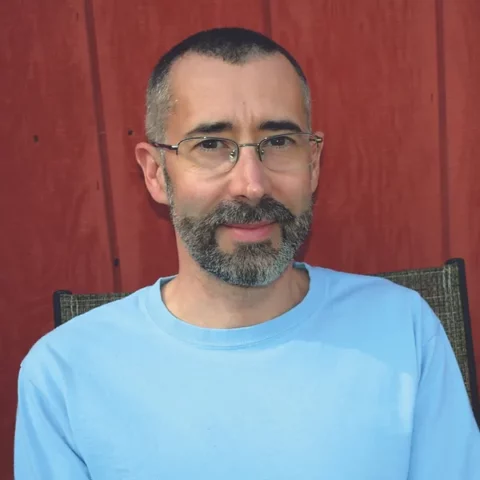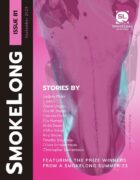Your whole essay has a texture of unreality, as if I’m looking through a kaleidoscope. I was struck by the use of second person and of an implied subject, of verbs that move almost without body. And yet, it is so physically rendered. Was this an atmosphere you created intentionally, or did it arise naturally? How did you balance the physical and the metaphysical in this piece? What elements do you think led themselves to the world of dreams?
This piece developed from notes toward a memoir I’m working on. I’m still not sure exactly what final form it’ll take in the book, but at some point I decided there would be an anxiety dreams chapter, so I began to gather notes under that heading.
For the SLQ workshop assignment where this piece was born, I gathered some of these notes and narrowed and arranged them, looking for patterns and themes, tying together loose ends. I also wrote a sequel to this piece later in the workshop from a different batch of notes.
Fragmented forms are a favorite of mine. In drafting, I often place unrelated pieces next to each other to see what develops from their nearness, what new connections present themselves. Dream-forms often concentrate real-life inner and outer conflicts into scenes and details that are visceral, surreal, and emotionally impactful. They work especially well, I think, in flash.
This piece is populated by the grasping arm of want. Even B. craves something in his self-denial. He hungers for that “pure state,” for a life without want, a life that sounds like death. What is the difference, to you, between wanting and having? Is hunger a power or a crutch? When we stop wanting, do we stop living?
Maybe B.’s goal is the separation of spirit and body. His theory being that it’s only the body that wants; if we were pure spirit, we might simply be. Of course, in this life, we’re tied to the bodies we inhabit, which is his tragedy at the end.
I think hunger can be a power and a crutch. If we don’t desire something—what makes us get out of bed in the morning? A purification of our desire might be a worthy goal: focusing it, making it creative and constructive. There’s also the issue of satisfying our desire, which is difficult to do.
You present a few versions of death and afterlife: one as “energy absorbed into the universe’s mists,” another as the classic “Pearly Gates.” The piece even ends on a question of afterlife. What do you make of everyone’s different dreams of afterlife? Can desire fend off death? Does knowing we will die change anything about how we live?
I completed an early draft of this piece and wasn’t satisfied with the ending. Shortly after, I dreamt about my grandfather and the funeral program, and I thought it fit.
Our differing dreams of afterlife are fascinating, and I think are often a difference of perspective, a choice to describe the same state with different language. Do our bodies melt into the soil, from where other life grows, or are we dropped with a thud into a cold hole in the ground?
I wonder if desire ends at death—or if it throbs on, a bodyless ache pulsing into the infinite darkness of time.
From the first word, “anxiety,” your piece presents us with fear, the fear of death and the fear of living. I wonder, what are your good dreams, your blissful dreams, your serenity dreams?
I’m not sure I have serenity dreams, but I do have happy ones: adventure dreams, in which loved ones and I are heroes of an action movie-like plot; dreams in which we join neighbors and strangers in an outdoor music festival or block party, and we all dance in pure joy; reunion dreams, in which I’m joined by deceased loved ones—my dad, especially—which end in deeply satisfying hugs.
The spacing and structure of this piece is so evocative of dreaming, somehow both jarring and like a lullaby. You “Thread the cravings,” these disparate dreams, together with theme and image. I was taken with the images of bugs and vermin mixed in with the theme of hunger. What place does violence, disgust even, have in desire, in hunger, in craving?
“Thread the cravings” was a reminder I jotted to myself in the margin of the draft, which in the end I incorporated into it.
Violence, disgust and darkness can all be part of those cravings we wish to purify away. Yet they’re inextricably part of our bodies and spirits, and of the world around us. Do we ignore them? Embrace them? Try to understand them? Lock them in a closet, or pull them into the light? Many of us have probably tried all of these at one time or another.



 The SmokeLong Grand Micro Contest (The Mikey) is now an annual competition celebrating and compensating the best micro fiction and nonfiction online.
The SmokeLong Grand Micro Contest (The Mikey) is now an annual competition celebrating and compensating the best micro fiction and nonfiction online.